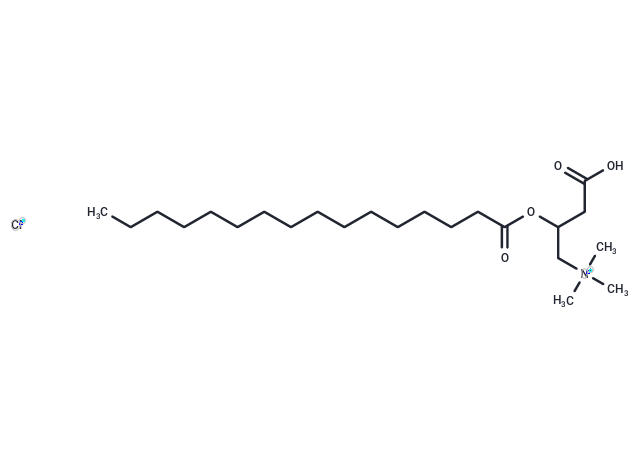
Palmitoylcarnitine chloride
CAS No. 6865-14-1
Palmitoylcarnitine chloride( —— )
Catalog No. M33228 CAS No. 6865-14-1
Palmitoylcarnitine chloride (Palmitoyl DL-carnitine chloride) is a mitochondrial fatty acid oxidation intermediate that mediates intralipid cardioprotection.
Purity : >98% (HPLC)
 COA
COA
 Datasheet
Datasheet
 HNMR
HNMR
 HPLC
HPLC
 MSDS
MSDS
 Handing Instructions
Handing Instructions
| Size | Price / USD | Stock | Quantity |
| 2MG | 53 | In Stock |


|
| 5MG | 70 | In Stock |


|
| 10MG | 103 | In Stock |


|
| 25MG | 174 | In Stock |


|
| 50MG | 265 | In Stock |


|
| 100MG | 392 | In Stock |


|
| 500MG | 881 | In Stock |


|
| 1G | Get Quote | In Stock |


|
Biological Information
-
Product NamePalmitoylcarnitine chloride
-
NoteResearch use only, not for human use.
-
Brief DescriptionPalmitoylcarnitine chloride (Palmitoyl DL-carnitine chloride) is a mitochondrial fatty acid oxidation intermediate that mediates intralipid cardioprotection.
-
DescriptionPalmitoylcarnitine chloride is a fatty acid-derived mitochondrial substrate, and selectively decreases cell survival in colorectal and prostate cancer cells by affecting on pro-inflammatory pathways, Ca2+ influx, and DHT-like effects.
-
In Vitro——
-
In Vivo——
-
Synonyms——
-
PathwayAngiogenesis
-
TargetPKC
-
RecptorPKC
-
Research Area——
-
Indication——
Chemical Information
-
CAS Number6865-14-1
-
Formula Weight436.07
-
Molecular FormulaC23H46ClNO4
-
Purity>98% (HPLC)
-
SolubilityIn Vitro:?H2O : 50 mg/mL (114.66 mM; Ultrasonic)
-
SMILES[Cl-].CCCCCCCCCCCCCCCC(=O)OC(CC(O)=O)C[N+](C)(C)C
-
Chemical Name——
Shipping & Storage Information
-
Storage(-20℃)
-
ShippingWith Ice Pack
-
Stability≥ 2 years
Reference
1. Al-Bakheit A, et al. Accumulation of Palmitoylcarnitine and Its Effect on Pro-Inflammatory Pathways and Calcium Influx in Prostate Cancer. Prostate. 2016 Oct;76(14):1326-37.?
molnova catalog



related products
-
ZIP
Novel, cell-permeable inhibitor of protein kinase Mζ (PKMζ), a constitutively active, atypical PKC isozyme involved in LTP maintenance. Selectively blocks PKMζ-induced synaptic potentiation in hippocampal slices in vitro. Reverses late-phase LTP (IC50 = 1 - 2.5 μM) and produces persistent loss of 1-day-old spatial memory following central administration in vivo.
-
Go 6976
A potent, selective protein kinase C (PKC) inhibitor that selectively inhibits PKCα and PKCβ1 with IC50 of 2.3 and 6.2 nM, respectively.
-
VTX-27
VTX-27 is a selective inhibitor of protein kinase C θ (PKC θ) (Kis: 0.08 nM and 16 nM for PKC θ and PKC δ).



 Cart
Cart
 sales@molnova.com
sales@molnova.com


